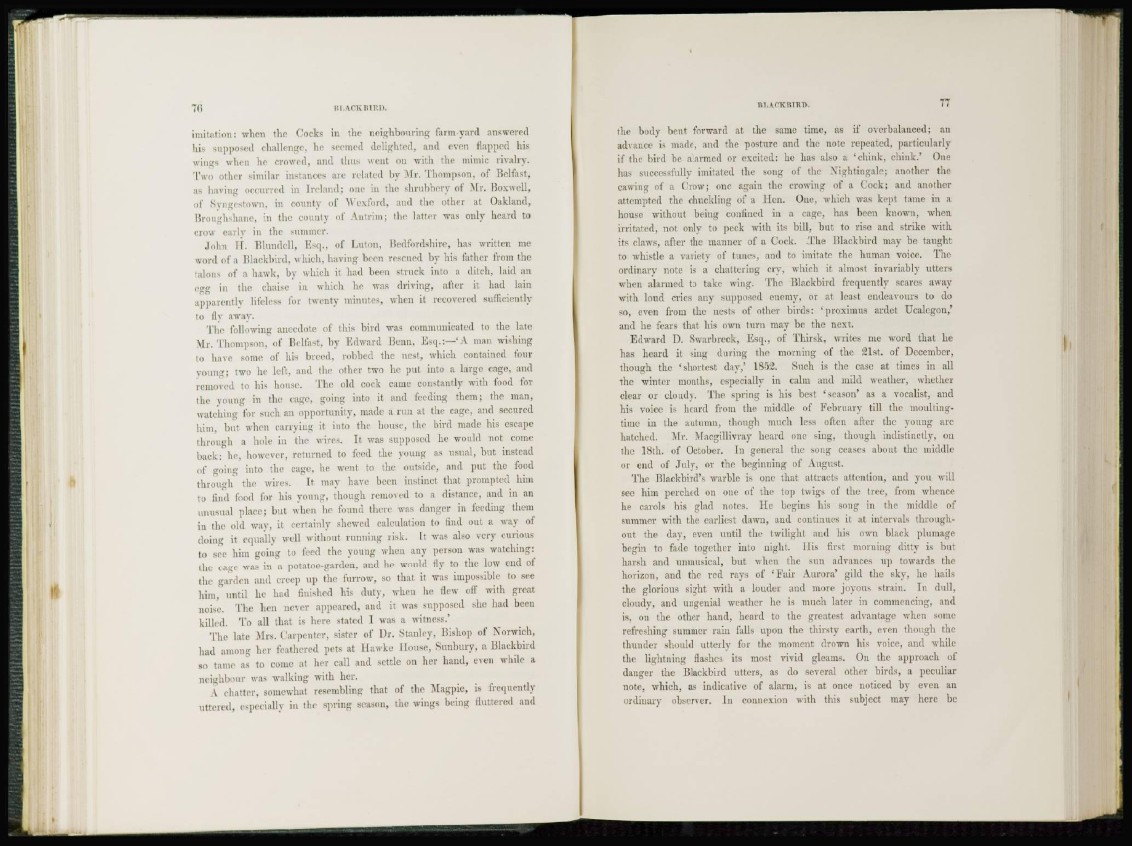
imitation: when the Cocks in the neighbouring farm yard answered
His supposed challenge, he seemed delighted, and even flapped his
wings when he crowed, and thus went on with the mimic rivalry.
Two other similar instances are related by .Mr. Thompson, of Belfast,
as having occurred in Ireland; one in the shrubbery of Mr. Boxwell,
of Nyngrstnwn. in county of Wexford, and the other at Oakland,
IJroughshane, in the county of Antrim; the latter was only heard to
crow early in the summer.
John II. Blundell, Eaq., of Luton. Bedfordshire, has written me
word of a Blackbird, which, having been rescued by his father from the
talons of a hawk, bv which it had been struck into a ditch, laid an
egg in the chaise in which he was driving, after it had lain
apparently lifeless lor twenty minutes, when it recovered sufficiently
to flv awav.
Tin- following anecdote of this bird was communicated to the late
Mr. Thompson, of Belfast, by Edward Bean, Esq.:—'A man wishing
to Inn e some of' his breed, robbed the nesl, which contained four
young; two he left, and the other two he put iuto a large cage, and
removed to hi- house. The old cock came constantly with food for
the young in the cage, going into it and feeding them; the man,
watching for such an opportunity, made a run at the cage, and secured
him, but when carrying it into the house, the bird made his escape
through a hole in the wires. It was supposed he would not come
hack: he. however, returned to feed the young as usual, but instead
of going into the cage, he went to the outside, and put the food
through the wire--. Il may have been instinct that prompted him
to find food for his young, though removed to a distance, and in an
unusual place: but when he found there was danger in feeding them
iu the old way, it certainly shewed calculation to find out a way of
doing it equally well without running risk. It was also very curious
to see him going to feed the young when any person was watching:
the cage was in a potatoe-g&rden, and he would fly to the low end of
(he garden and creep up the furrow, so that it was impossible to see
him, until he had finished his duty, when he flew off with great
noise. The hen never appeared, and it was supposed she had been
killed. To all that is here stated I was a witness.'
The late Mrs. Carpenter, sister of Dr. Stanley, Bishop of Norwich,
had among her feathered pets at Eawke House, Sunbury, a Blackbird
so tame as to come at her call and settle on her hand, even while a
neighbour was walking with her.
A chatter, somewhat resembling that of the Magpie, is frequently
uttered, especially iu the spring season, the wings being fluttered and
the body bent forward at the same time, as if overbalanced; an
advance is made, and the posture and the note repeated, particularly
if the bird be alarmed or excited: he has also a 'chink, chink.* One
has successfully imitated the song of the Nightingale; another the
cawing of a Crow; one again the crowing of a Cock; and another
attempted the chuckling of a Hen. One, which was kept, tame iu a
house without being confined in a cage, has been known, when
irritated, not only to peck with its bill, but to rise and strike with
its claws, after the manner of a Cock. The Blackbird may be taught
to whistle a variety of tunes, and to imitate the human voice. The
ordinary note is a chattering cry, which it almost invariably utters
when alarmed to take wing. The Blackbird frequently scares away
with loud cries any supposed enemy, or at least endeavours to do
so, even from the nests of other birds: 'proximus ardet Ucalcgon,'
and he fears that his own turn may be the next.
Edward D. Swarbreck, Esq., of Thirsk, writes me word that he
has heard it sing during the morning of the l21st. of December,
though the 'shortest day,' 1852. Such is the case at times in all
the winter months, especially in calm and mild weather, whether
clear or cloudy. The spring is his best 'season* as a vocalist, and
his voice is heard from the middle of February till the moultingtime
in the autumn, though much less often after the young are
hatched. Mr. MacgUlivray heard one sing, though indistinctly, on
the 18th. of October. In general the song ceases about the middle
or end of July, or the beginning of August.
The Blackbird's warble is one that attracts attention, and you will
see him perched on one of the top twigs of the tree, from whence
he carols his glad notes. He begins his song in the middle of
summer with the earliest dawn, and continues it at intervals throughout
the day, even until the twilight and his own black plumage
begin to fade together into night. His first morning ditty is but
harsh and unmusical, but when the sun advances up towards the
horizon, and the red rays of ' Fair Aurora' gild the sky, he hails
the glorious sight with a louder and more joyous strain. In dull,
cloudy, and ungcuial weather he is much later in commencing, and
is, on the other hand, heard to the greatest advantage when some
refreshing summer rain falls upon the thirsty earth, even though the
thunder should utterly for the moment drown his voice, and while
the lightning flashes its most vivid gleams. On the approach of
danger the Blackbird utters, as do several other birds, a peculiar
note, which, as indicative of alarm, is at once noticed by even an
ordinary observer. In connexion with this subject may here be